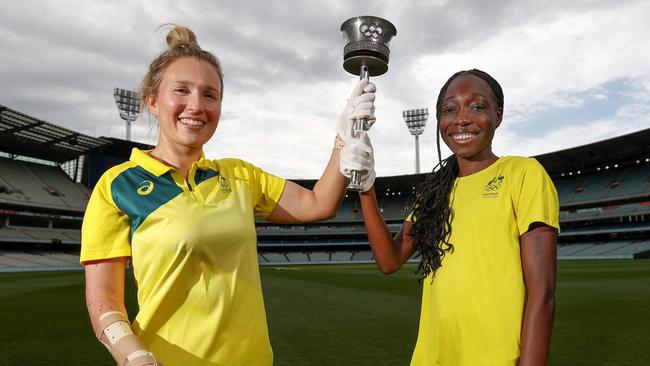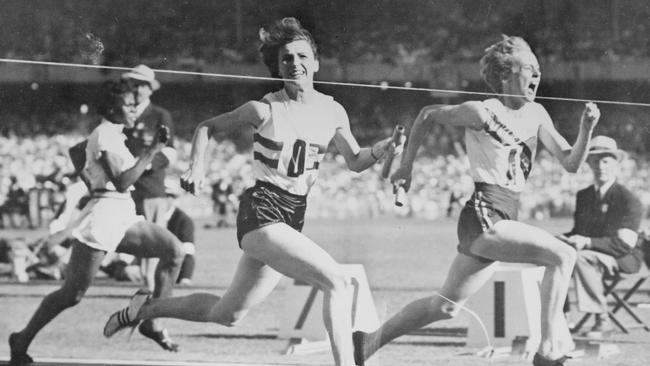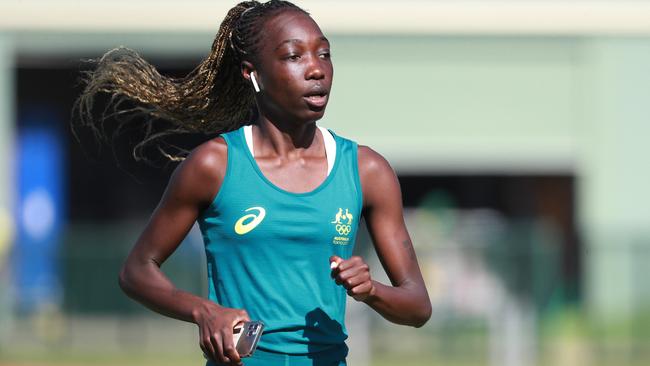Young Aussie sprinter Bendere Oboya reveals special moment holding 1956 Melbourne Olympic torch
It’s 65 years since the Olympics that defined a nation. Melbourne was the catalyst for so much change, and for one current Aussie athlete on her first visit to the MCG, that legacy hasn’t been lost.
Olympics
Don't miss out on the headlines from Olympics. Followed categories will be added to My News.
Bendere Oboya became the link between Australia’s Olympic past and future when she stood on the MCG with the torch that lit the Olympic flame in Melbourne 65 years ago.
The Tokyo Olympian - born in the year of the Sydney Games, who hopes to still be competing when Brisbane hosts the Olympics in 2032 - is a new arrival to Melbourne, just as she was to Australia when she landed on these shores with her family from Ethiopia at the age of three.
Melbourne’s Games, which opened on November 22, in 1956, kicked off a 17-day celebration of sport that would help define Australia as a sporting nation.

The first Olympics held in the southern hemisphere, would become known as “the friendly Games” and changed the nature of the movement despite being held just a decade after the end of World War II and against an uneasy international backdrop of the Suez Crisis and Hungarian Revolution.
Australia dominated in the pool and on the track, spawning a “golden generation” of heroes from Dawn Fraser and Murray Rose to Betty Cuthbert, to Ron Clarke, who lit the cauldron and John Landy, who recited the Olympic oath.
And the legacy has not been lost on a new generation of athletes.
“When we held the torch, we had to put our gloves on, so it was quite a special moment,” said Oboya, who ran the 400m in Tokyo and recently moved to Melbourne to link with Peter Bol’s coach in a bid to move up to 800m for the Paris Olympics.
“That was my first time also at the MCG, so to hold the torch, that was an incredible part of my day.
“When I learned (the Olympics) were 65 years ago, it just makes you look back and go, wow.

“This stadium was packed, there were people up the top and down the bottom and there I am, just down where the actual Olympic action was, so it was quite surreal.”
Neither the 400m nor 800m was run on the cinders track by women in Melbourne, with just nine events held on the athletics program, although Australia dominated, winning four gold.
Three of those went to Betty Cuthbert, who had a medal struck in her honour by Athletics Australia in 2018, for the best single performance at a national championships.
“That’s quite amazing to see how far women have come over the years,” Oboya said.
“It really does show what women had to overcome - if you look at the Olympics now, we have the 1500m, the 800m, so women have come a really long way and I think it’s just empowered little girls to step up and chase their dreams once they see us.”
Cuthbert’s efforts have certainly motivated Oboya.

“You see other people getting medals and it’s definitely inspiring because they’re in the same country as you - it may not be the same event, but that could be you, so it really does inspire me to work towards that goal in the next Olympics,” she said.
The Melbourne Games paved the way for plenty - from aspiring Australian athletes, to prospective host cities, broadcasts on television and a new way forward for athletes to mix after the suggestion of school student John Ian Wing changed Olympic closing ceremonies forever.
And Oboya hopes Australia’s next Games could do the same in a new-look country.
“I’m all about diversity and seeing a lot of different people coming together to represent Australia, seeing different colours. It’s definitely changed over the years, I reckon,” he said.
“So looking to the Games in (Brisbane), that’s going to be amazing to see that involvement.
“It’s going to be crazy, exciting at the same time.
“And it’s going to bring back the memory I had holding that (Melbourne) torch.”


